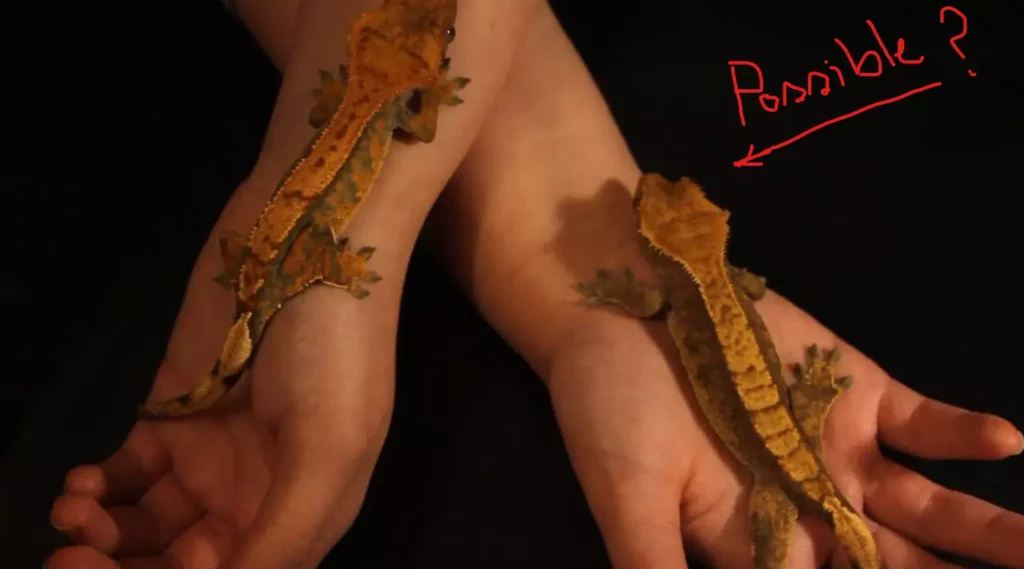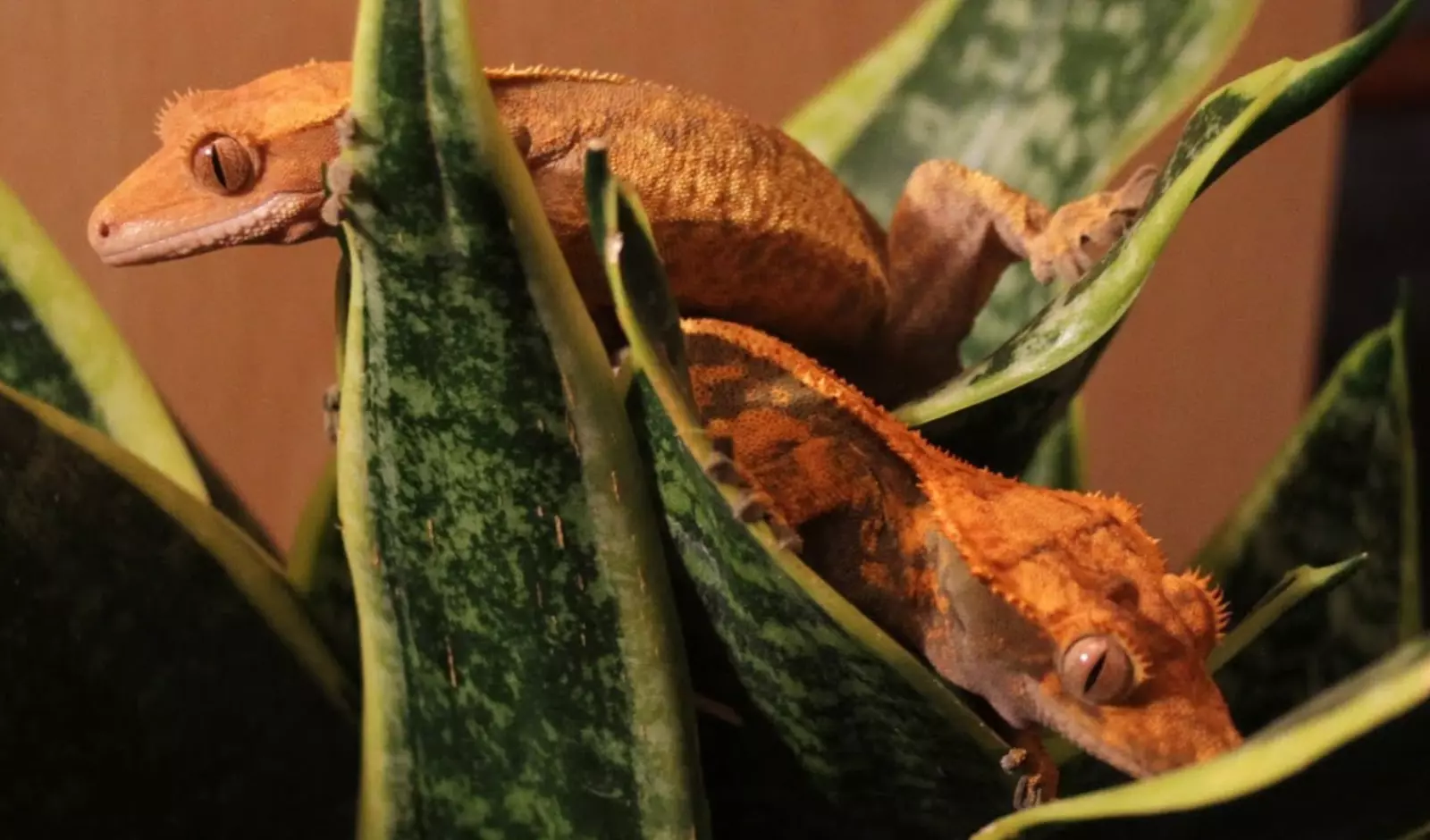One of the most common questions that crested gecko owners have is whether they can house two or more of these animals together.
The answer is no; you should never house two crested geckos together.
But Why?
In this article, I will explore the pros and cons of cohabiting crested geckos, especially male and female pairs, and provide insight into what will happen if you do!
Let’s dive in…
Key Takeaways:
- Crested geckos are solitary animals and do not form bonds with each other.
- Keeping multiple crested geckos in the same enclosure can cause stress and lead to fighting.
- Crested geckos have individual personalities, and what works for one gecko may not work for another.
- Males are more territorial than females and are more likely to fight with each other.
- Even if two or more females are housed together, there is still a risk of aggression and dominance behavior.
But Why Do Some People Think That Crested Geckos Can Live Together?

This is because they see them in groups at pet stores or breeders.
They might have also found conflicting or outdated information online, suggesting that crested geckos are social animals that require companionship and interaction with their own kind.
However, the reality is quite different!
Crested Geckos are actually solitary and territorial animals. They prefer to live alone.
In the wild, they only come together to mate, and they don’t form bonds or hierarchies with other Crested Geckos.
That being said…
Why You Shouldn’t Keep Two Crested Geckos Together
Now, let’s go into more details:
Reason 1) Crested geckos are solitary and territorial animals

In the wild, crested geckos live in small home ranges that they patrol and mark with their scent glands. They avoid contact with other crested geckos unless they are ready to mate.
They are mostly tree-dwelling animals, spending most of their time up in trees and looking for insects and fruits at night.
Even when they’re in captivity, crested geckos still have these natural behaviors.
They still prefer having their own space and things they don’t have to share. They need a tall enclosure that looks like their natural home, with lots of branches and leaves, and a quiet, dark place to sleep during the day.
But how do crested geckos communicate and show aggression?
Generally crested geckos use visual, sound, smell, and touch cues to communicate with each other.
Some of the ways they do this include:
- Moving their head in a certain way
- Waving their tail
- Biting
- Chasing each other
- Making sounds
How about groups of just female geckos?: In my case, I’ve managed to keep two female crested geckos together without any issues. But, there is no guarantee that it will work for every case, and there are still some risks and challenges involved.
Reason 2) They can breed uncontrollably and cause health problems

If you put a male and a female crested gecko together, or if you house several females with one male, they can breed uncontrollably and lead to health issues.
We all want breeding, right? So, how does it affect their health?
Well, while breeding is indeed a natural and desirable aspect, it can have unintended consequences if not managed carefully.
Here’s how it can affect their health:
- Stress: Frequent breeding attempts and interactions can stress the geckos, especially the females. Stress weakens their immune system, making them more prone to diseases and other health problems.
- Resource Depletion: Breeding puts a lot of strain on the female’s body. Producing eggs and taking care of offspring requires a lot of energy and nutrients. If they don’t receive the proper nutrition and supplements, the female can become malnourished, leading to various health problems.
- Injuries: Male may become aggressive during mating attempts, potentially causing physical harm to the female.
Additionally, female crested geckos need extra calcium to produce healthy eggs and babies.
If she does not get enough calcium from her diet or supplements, she may develop metabolic bone disease (MBD), which can cause deformities, fractures, paralysis, or death.
Since both will compete for food, the female gecko may become malnourished and suffer from vitamin deficiencies.
Just a Quick Heads-up: A female crested gecko can produce up to 20 or more babies in a year if she is constantly exposed to a male crested gecko. This is because she can retain sperm for up to a year and use it to fertilize multiple clutches of eggs. However, this is not natural or healthy for her, as it can deplete her calcium reserves and exhaust her body.
How To Care For The Offspring Of Crested Geckos

If you end up with offspring from your crested geckos, either intentionally or unintentionally, you have to know how to care for them properly.
Crested gecko eggs take about 60 to 90 days to hatch, depending on the temperature and humidity of the incubator.
In the meantime, keep the eggs in a moist substrate, such as vermiculite or perlite, in a small container with air holes. Check the eggs regularly for any signs of mold, fungus, or dehydration.
Once the eggs hatch, move the hatchlings to their own enclosures.
You can house up to four hatchlings together in a 10-gallon tank but must separate them by sex as soon as possible.
F.A.Q.s
Q: How many Crested Geckos can Live Together
Crested geckos usually prefer to live alone, so it’s best to keep them solo in a tank.
Some say female crested geckos can be housed in small groups with low chances of fighting, but remember, they might establish a pecking order.
In a spacious tank, you might be able to house up to five female crested geckos together, but it’s better to go with a smaller group if possible.
Q: Can two female crested geckos live together peacefully?
No, it is not guaranteed that two female crested geckos will live together peacefully.
Even though females are less likely to fight than males, they can still show signs of stress and aggression when they have to share their space and resources with another crested gecko.
They may also have different needs and preferences for their environment, depending on their age, size, health, and
Q: Can two male crested geckos live together without fighting?
No, it is very unlikely that two male crested geckos will live together without fighting.
Male crested geckos are very territorial and will try to assert their dominance over each other.
They may fight over food, water, hiding spots, sleeping spots, or basking areas.

